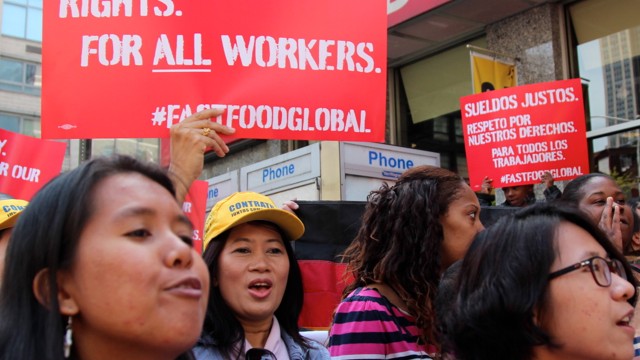This post originally appeared at TalkPoverty.org, a new blog launched today by former Nation poverty correspondent and Moyers & Company guest, Greg Kaufmann.

We’re at a critical moment in our economic recovery that requires real leadership and people power to ensure true economic democracy in our country. There is incredible work being done to build a strong antipoverty movement, and spaces like these are fundamental to encourage an open dialogue about our strategies and tactics as well as our successes and failures.
As corporate profits keep soaring, workers’ wages continue to stagnate, creating the widest income inequality gap our nation has seen in modern times. At Jobs With Justice we still believe that in America, people who work hard should be paid enough to live with dignity and raise a family. Today, millions of people go to work every day and still don’t earn enough money to feed their families. If people can work full-time and still can’t afford groceries, rent and medication, then the entire model is flawed and unfair. We can’t continue down this path of creating bottom-of-the-barrel, low-wage jobs that condemn our friends and neighbors to poverty.
A critical first step toward regaining our country’s shared prosperity is to insist that lawmakers adopt a meaningful increase in the minimum wage. The Fair Minimum Wage Act would update the federal minimum wage from $7.25 to $10.10 an hour and give the law teeth by indexing it to inflation. According to the Congressional Budget Office, even this slight increase — which would be the first since 2009 — would raise 900,000 Americans above the official poverty level. And it would boost pay for 30 million people, many of whom are teetering just above the poverty line.
Raising the minimum wage is essential to combating poverty in America. After all, of the 46.2 million Americans who live below the official threshold for poverty in the United States (less than $18,284 annually for a family of three), at least 10.4 million — or more than one in five — are “working poor.” According to other studies, as many as half of all poor families — and more than 70 percent of nearly poor families — were working in 2011. In other words, for millions of Americans, poverty isn’t caused by the inability to work or to find work, it’s caused by lousy pay.
The evidence of the “working poor” is everywhere. Food stamp participation since 1980 has grown the fastest among people who actually have jobs. Fifty-two percent of fast food industry workers, for example, rely on public assistance like food stamps because their jobs don’t pay well enough to make ends meet. The situation has only gotten worse as decent middle-class jobs lost during the recession have been disproportionately replaced by low-wage jobs, even as corporate profits have skyrocketed.
But a minimum wage increase isn’t a panacea. While $7.25 is not okay, $10.10 isn’t really enough for people to support themselves and their families. At Jobs With Justice, we are continuing to demand much more in order to counter decades of corporate-backed legislative policies that have driven down labor standards, burdened taxpayers and valued profits over people.
To achieve shared prosperity, all working people need to regain their bargaining power so that they have a real voice and opportunity in shaping their jobs and our economy. That means we need to continue fighting to ensure workers have the right to organize and bargain for better wages, standards and working conditions.
We also need to create more affordable housing for low-income families, improve our public education system — and expand access to college and job training programs — and invest in public transportation and the growing care giving industry so more Americans can afford to get to work and know their families are being cared for. We also need to fix fundamental structural problems — like skyrocketing executive pay, rampant income inequality and regressive tax policies — that rig our economy to work for big business and the top 1 percent at the expense of everyone else.
We all deserve the chance to secure the quality of life we want for ourselves and our children. We can start turning the economy around by demanding higher wages and better jobs. Increasing the federal minimum wage to $10.10 an hour is a crucial first step toward alleviating poverty in America and creating an economy that works for everyone, not just the wealthy and well-connected.


